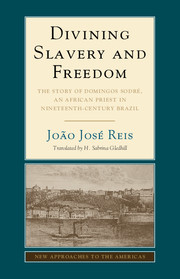 Divining Slavery and Freedom
Divining Slavery and Freedom Book contents
- Frontmatter
- Dedication
- Contents
- Preface
- Abbreviations
- Map
- 1 Cops and Candomblé in Domingos Sodré's Day
- 2 From an African in Onim to a Slave in Bahia
- 3 Domingos Sodré, Diviner
- 4 Witchcraft and Slavery
- 5 Witchcraft and Manumission
- 6 Meet Some Friends of Domingos Sodré
- 7 Domingos Sodré, Ladino Man of Means
- Epilogue
- Timeline of Domingos Sodré's Life
- Glossary
- Appendix 1 Domingos Sodré's Last Will and Testament (1882)
- Appendix 2 Domingos' Manumission and Manumissions Granted by Him
- Appendix 3 Delfina's Petition Guaranteeing Her Mental Health
- Illustration and Map Credits
- Bibliography
- Acknowledgments
- Name Index
- Subject Index
1 - Cops and Candomblé in Domingos Sodré's Day
Published online by Cambridge University Press: 05 May 2015
- Frontmatter
- Dedication
- Contents
- Preface
- Abbreviations
- Map
- 1 Cops and Candomblé in Domingos Sodré's Day
- 2 From an African in Onim to a Slave in Bahia
- 3 Domingos Sodré, Diviner
- 4 Witchcraft and Slavery
- 5 Witchcraft and Manumission
- 6 Meet Some Friends of Domingos Sodré
- 7 Domingos Sodré, Ladino Man of Means
- Epilogue
- Timeline of Domingos Sodré's Life
- Glossary
- Appendix 1 Domingos Sodré's Last Will and Testament (1882)
- Appendix 2 Domingos' Manumission and Manumissions Granted by Him
- Appendix 3 Delfina's Petition Guaranteeing Her Mental Health
- Illustration and Map Credits
- Bibliography
- Acknowledgments
- Name Index
- Subject Index
Summary
CANDOMBLÉ BETWEEN TOLERANCE AND REPRESSION
The day before Christmas Eve, 1858, a group of African freedpersons (i.e., ex-slaves) gathered for a batuque, the general expression then used for an African drumming session, in the Cruz do Cosme neigh-borhood on the outskirts of Salvador. Suddenly, the police surrounded and invaded the house, arresting people and seizing objects pertaining to Candomblé ceremonies. This raid caused a rift between the local subdelegado, or deputy chief constable, and the chief of police. In an official letter to his superior, subdelegado Manoel Nunes de Faria complained that he had not been informed of that police action. He later found out that the group of Africans had been arrested “for being found drumming.” He questioned that charge, and protested:
First, for your information, there was no such batuque, of which I am very well aware, and the Africans were at work, and this is nothing more than harassment, and if you perchance should pass by one afternoon and see the work of these Africans you would be amazed, and would even want to ensure that they stay in this parish, therefore it is precisely in light of this persecution that you should have them released and if you do so you will be doing them a great justice.
He went on to state that the lieutenant commander of the urban police had acted “as if there were no subdelegado in the parish, which is highly astonishing” and described the raid as typical “absolutism,” indicating a lack of confidence in his authority. If the chief of police did not trust the subdelegado, “it would only be just to fire him,” the aggrieved officer concluded.
To provide a better understanding of this controversial issue and others that would arise later, I should say something about the structure of the police service in Bahia at the time.
- Type
- Chapter
- Information
- Divining Slavery and FreedomThe Story of Domingos Sodré, an African Priest in Nineteenth-Century Brazil, pp. 1 - 31Publisher: Cambridge University PressPrint publication year: 2015
